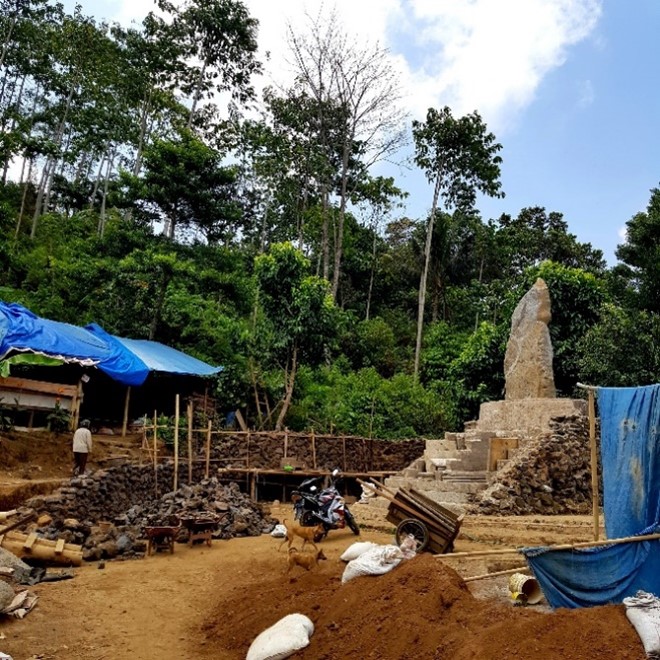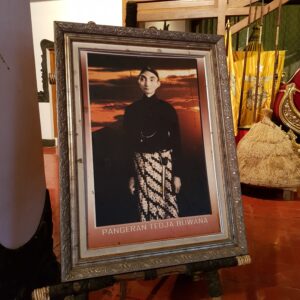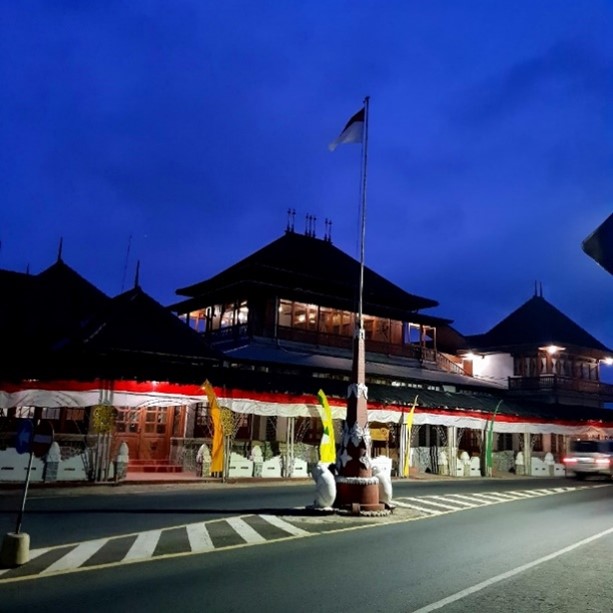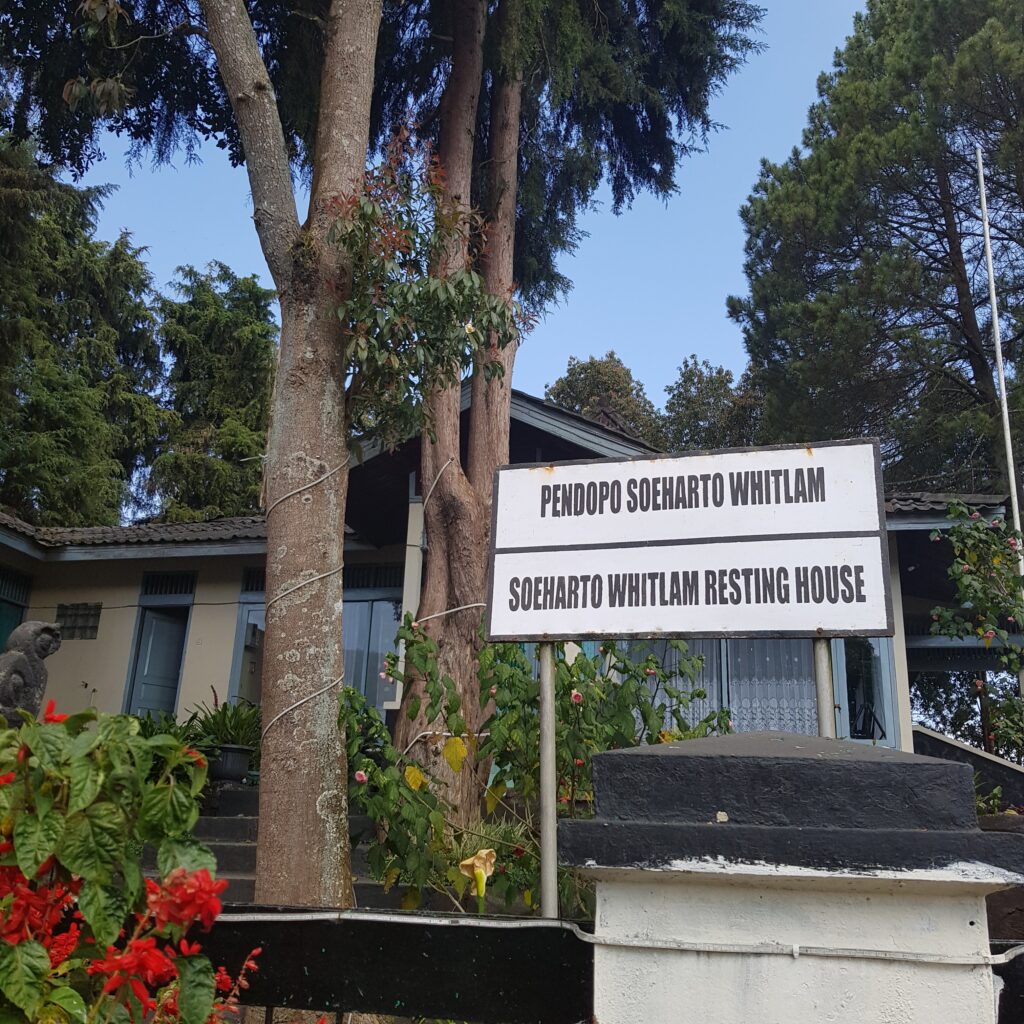Before I digress slightly, let me state from the outset that the book by Greg Poulgrain that I am about to review is extraordinary by any measure. The story he tells is one you will read nowhere else, especially in the way he links the assassination of President Kennedy to former CIA Director Allen Dulles and the engineering by the latter of one of the 20th century’s most terrible mass murders. It will make your hair stand on end and should be read by anyone who cares about historical truth.
About twelve years ago I taught a graduate school course to Massachusetts State Troopers and police officers from various cities and towns. As part of the course material, I had created a segment on the history of the United States’ foreign policy, with particular emphasis on Indonesia.
No one in this class knew anything about Indonesia, not even where it was. These were intelligent, ambitious adults, eager to learn, all with college degrees. This was in the midst of the “war on terror”; i.e., war on Muslim countries, and the first year of Barack Obama’s presidency. Almost all the class had voted for Obama and were aware they he had spent some part of his youth in this unknown country somewhere far away.
I mention this as a preface to this review of JFK vs. Dulles, because its subtitle is Battleground Indonesia, and my suspicion is that those students’ lack of knowledge about the intertwined history of Indonesia and the U.S. is as scanty today among the general public as it was for my students a dozen years ago.
 This makes Greg Poulgrain’s remarkable book – JFK vs. Allen Dulles: Battleground Indonesia – even more important since it is a powerful antidote to such ignorance, and a reminder for those who have fallen, purposefully or not, into a state of historical amnesia that has erased the fact that the U.S. has committed systematic crimes that have resulted in the deaths of more than a million Indonesians and many more millions throughout the world over innumerable decades.
This makes Greg Poulgrain’s remarkable book – JFK vs. Allen Dulles: Battleground Indonesia – even more important since it is a powerful antidote to such ignorance, and a reminder for those who have fallen, purposefully or not, into a state of historical amnesia that has erased the fact that the U.S. has committed systematic crimes that have resulted in the deaths of more than a million Indonesians and many more millions throughout the world over innumerable decades.
Such crimes against humanity have been hidden behind what the English playwright Harold Pinter in his 2005 Nobel Prize address called “a tapestry of lies.” Of such massive crimes, he said:
But you wouldn’t know it.
It never happened. Nothing ever happened. Even while it was happening it wasn’t happening. It didn’t matter. It was of no interest. The crimes of the United States have been systematic, constant, vicious, remorseless, but very few people have actually talked about them.
And when one examines the true history of such atrocities, again and again one comes up against familiar names of the guilty who have never been prosecuted. Criminals in high places whose crimes around the world from Vietnam to Chile to Cuba to Nicaragua to Argentina to Iraq to Libya to Syria, etc. have been – and continue to be – integral to American foreign policy as it serves the interests of its wealthy owners and their media mouthpieces.
In his brilliant new book on U.S./Indonesian history, Dr. Greg Poulgrain unweaves this tapestry of lies and sheds new light on the liars’ sordid deeds. He is an Australian expert on Indonesia whose work stretches back forty years, is a professor at University of the Sunshine Coast in Brisbane and has written four highly-researched books about Indonesia.
In JFK vs. Dulles, he exposes the intrigue behind the ruthless regime-change strategy in Indonesia of the longest-serving CIA director, Allen Dulles, and how it clashed with the policy of President John F. Kennedy, leading to JFK’s assassination, Indonesian regime change, and massive slaughter.
Poulgrain begins with this question:
Would Allen Dulles have resorted to assassinating the President of the United States to ensure that his ‘Indonesian strategy’ rather than Kennedy’s was achieved?
To which he answers: Yes.
But let me not get ahead of myself, for the long, intricate tale he tells is one a reviewer can only summarize, so filled is it with voluminous details. So I will touch on a few salient points and encourage people to buy and read this important book.
Indonesia’s Strategic Importance
The strategic and economic importance of Indonesia cannot be exaggerated. It is the world’s 4th most populous country (275+ million), is located in a vital shipping lane adjacent to the South China Sea, has the world’s largest Muslim population, has vast mineral and oil deposits, and is home in West Papua to Grasberg, the world’s largest gold mine and the second largest copper mine, primarily owned by Freeport McMoRan of Phoenix, Arizona, whose past board members have included Henry Kissinger, John Hay Whitney, and Godfrey Rockefeller.
Long a battleground in the Cold War, Indonesia remains vitally important in the New Cold War and the pivot to Asia launched by the Obama administration against China and Russia, the same antagonists Allen Dulles strove to defeat through guile and violence while he engineered coups home and abroad. It is fundamentally important in the Pentagon’s Indo-Pacific strategy for what it euphemistically calls a “free and open Indo-Pacific.” While not front-page news in the U.S., these facts make Indonesia of great importance today and add to the gravity of Poulgrain’s historical account.
JFK
Two days before President John Kennedy was publicly executed by the US national security state led by the CIA on November 22, 1963, he had accepted an invitation from Indonesian President Sukarno to visit that country the following spring. The aim of the visit was to end the conflict (Konfrontasi) between Indonesia and Malaysia and to continue Kennedy’s efforts to support post-colonial Indonesia with economic and developmental aid, not military. It was part of his larger strategy of ending conflict throughout Southeast Asia and assisting the growth of democracy in newly liberated post-colonial countries worldwide.
He had forecast his position in a dramatic speech in 1957 when, as a Massachusetts Senator, he told the Senate that he supported the Algerian liberation movement and opposed colonial imperialism worldwide. The speech caused an international uproar and Kennedy was harshly attacked by Eisenhower, Nixon, John Foster Dulles, and even liberals such as Adlai Stevenson. But he was praised throughout the third world.
Poulgrain writes:
Kennedy was aiming for a seismic shift of Cold War alignment in Southeast Asia by bringing Indonesia ‘on side.’ As Bradley Simpson stated (in 2008), ‘One would never know from reading the voluminous recent literature on the Kennedy and Johnson administrations and Southeast Asia, for example, that until the mid-1960s most officials [in the US] still considered Indonesia of far greater importance than Vietnam or Laos.
Of course, JFK never went to Indonesia in 1964, and his peaceful strategy to bring Indonesia to America’s side and to ease tensions in the Cold War was never realized, thanks to Allen Dulles. And Kennedy’s proposed withdrawal from Vietnam, which was premised on success in Indonesia, was quickly reversed by Lyndon Johnson after JFK’s murder on November 22, 1963. Soon both countries would experience mass slaughter engineered by Kennedy’s opponents in the CIA and Pentagon. Millions would die.
While the Indonesian mass slaughter of mainly poor rice farmers (members of the Communist Party – PKI) instigated by Allen Dulles began in October 1965, ten years later, starting in December 1975, the American installed Indonesian dictator Suharto, after meeting with Henry Kissinger and President Ford and receiving their approval, would slaughter hundreds of thousands East-Timorese with American-supplied weapons in a repeat of the slaughter of more than a million Indonesians in 1965 when the CIA engineered the coup d’état that toppled President Sukarno. The American installed dictator Suharto would rule for thirty years of terror. The CIA considers this operation one of its finest accomplishments. It became known as “the Jakarta Method,” a model for future violent coups throughout Latin America and the world.
And in-between these U.S. engineered mass atrocities, came the bloody coup in Chile on September 11, 1973 and the ongoing colossal U.S. war crimes in Vietnam, Laos, and Cambodia.
Dulles’s Secret
What JFK didn’t know was that his plans for a peaceful resolution of the Indonesia situation and an easing of the Cold War were threatening a covert long-standing conspiracy engineered by Allen Dulles to effect regime change in Indonesia through bloody means and to exacerbate the Cold War by concealing from Kennedy the truth that there was a Sino-Soviet split. Another primary goal behind this plan was to gain unimpeded access to the vast load of natural resources that Dulles had kept secret from Kennedy, who thought Indonesia was lacking in natural resources. But Dulles knew that if Kennedy, who was very popular in Indonesia, visited Sukarno, it would deal a death blow to his plan to oust Sukarno, install a CIA replacement (Suharto), exterminate alleged communists, and secure the archipelago for Rockefeller controlled oil and mining interests, for whom he had fronted since the 1920s.
Reading Poulgrain’s masterful analysis, one can clearly see how much of modern history is a struggle for control of the underworld where lies the fuel that runs the megamachine – oil, minerals, gold, copper, etc. Manifest ideological conflicts, while garnering headlines, often bury the secret of this subterranean devil’s game.
The Discovery of Gold
His murder mystery/detective story begins with a discovery that is then kept secret for many decades. He writes:
In the alpine region of Netherlands New Guinea (so named under Dutch colonial rule – today, West Papua) in 1936, three Dutchmen discovered a mountainous outcrop of ore with high copper content and very high concentrations of gold. When later analyzed in the Netherlands, the gold (in gram/ton) proved to be twice that of Witwatersrand in South Africa, then the world’s richest gold mine, but this information was not made public.
The geologist among the trio, Jean Jacques Dozy, worked for the Netherlands New Guinea Petroleum Company (NNGPM), ostensibly a Dutch-controlled company based in The Hague, but whose controlling interest actually lay in the hands of the Rockefeller family, as did the mining company, Freeport Sulphur (now Freeport McMoRan, one of whose Directors from 1988-95 was Henry Kissinger, Dulles’ and the Rockefeller’s close associate) that began mining operations there in 1966.
It was Allen Dulles, Paris-based lawyer in the employ of Rockefeller’s Standard Oil, who in 1935 arranged the controlling interest in NNGPN for the Rockefellers. And it was Dulles, among a select few others, who, because of various intervening events, including WW II, that made its exploitation impossible, kept the secret of the gold mine for almost three decades, even from President Kennedy, who had worked to return the island to Indonesian control. JFK “remained uninformed of the El Dorado, and once the remaining political hurdles were overcome, Freeport would have unimpeded access.” Those “political hurdles”; i.e., regime change, would take a while to effect.
The Need to Assassinate President Kennedy
But first JFK would have to be eliminated, for he had brokered Indonesian sovereignty over West Papua/West Irian for Sukarno from the Dutch who had ties to Freeport Sulphur. Freeport was aghast at the potential loss of “El Dorado,” especially since they had recently had their world’s most advanced nickel refinery expropriated by Fidel Castro, who had named Che Guevara its new manager. Freeport’s losses in Cuba made access to Indonesia even more important. Cuba and Indonesia thus were joined in the deadly game of chess between Dulles and Kennedy, and someone would have to lose.
While much has been written about Cuba, Kennedy, and Dulles, the Indonesian side of the story has been slighted. Poulgrain remedies this with an exhaustive and deeply researched exploration of these matters. He details the deviousness of the covert operations Dulles ran in Indonesia during the 1950s and 1960s. He makes it clear that Kennedy was shocked by Dulles’s actions, yet never fully grasped the treacherous genius of it all, for Dulles was always “working two or three stages ahead of the present.” Having armed and promoted a rebellion against Sukarno’s central government in 1958, Dulles made sure it would fail (shades of the Bay of Pigs to come) since a perceived failure served his long-term strategy. To this very day, this faux 1958 Rebellion is depicted as a CIA failure by the media. Yet from Dulles standpoint, it was a successful failure that served his long-term goals.
“This holds true,” Poulgrain has previously written, “only if the stated goal of the CIA was the same as the actual goal. Even more than five decades later, media analysis of the goal of The Outer Island rebels is still portrayed as a secession, as covert US support for ‘rebels in the Outer Islands that wished to secede from the central government in Jakarta’. The actual goal of Allen Dulles had more to do with achieving a centralized army command in such a way as to appear that the CIA backing for the rebels failed.”
Dulles’ the Devil
Dulles betrayed the rebels he armed and encouraged, just as he betrayed friend and foe alike during his long career. The rebellion that he instigated and planned to fail was the first stage of a larger intelligence strategy that would come to fruition in 1965-6 with the ouster of Sukarno (after multiple unsuccessful assassination attempts) and the institution of a reign of terror that followed. It was also when – 1966 – Freeport McMoRan began their massive mining in West Papua at Grasberg at an elevation of 14,000 feet in the Alpine region. Dulles was nothing if not patient; he had been at this game since WW I. Even after Kennedy fired him following the Bay of Pigs, his plans were executed, just as those who got in his way were. Poulgrain makes a powerful case that Dulles was the mastermind of the murders of JFK, U.N. Secretary General Dag Hammarskjold (working with Kennedy for a peaceful solution in Indonesia and other places), and Congolese President Patrice Lumumba, the first president of a newly liberated Congo.
His focus is on why they needed to be assassinated (similar in this regard to James Douglass’s JFK and the Unspeakable), though with the exception of Kennedy (since the how is well-known and obvious), he also presents compelling evidence as to the how. Hammarskjold, in many ways Kennedy’s spiritual brother, was a particularly powerful obstacle to Dulles’s plans for Indonesia and colonial countries throughout the Third World. Like JFK, he was committed to independence for indigenous and colonial peoples everywhere and was trying to implement his Swedish-style ‘third way,’ proposing a form of ‘muscular pacifism’.
Poulgrain argues correctly that if the UN Secretary General succeeded in bringing even half these colonial countries to independence, he would have transformed the UN into a significant world power and created a body of nations so large as to be a counter-weight to those embroiled in the Cold War.
He draws on documents from the South African Truth and Reconciliation Commission (TRC) and Chairman Archbishop Desmond Tutu to show the connection between South Africa’s “Operation Celeste” and Dulles’s involvement in Hammarskjold’s murder in September 1961. While it was reported at the time as an accidental plane crash, he quotes former President Harry Truman saying, “Dag Hammarskjold was on the point of getting something done when they killed him. Notice that I said, ‘When they killed him’.” Hammarskjold, like Kennedy, was intent on returning colonized countries to their indigenous inhabitants and making sure Papua was for Papuans, not Freeport McMoRan and imperial forces.
And Dulles sold his overt Indonesian strategy as being necessary to thwart a communist takeover in Indonesia. Cold War rhetoric, like “the war on terrorism” today, served as his cover. In this he had the Joint Chiefs of Staff on his side; they considered Kennedy soft on communism, in Indonesia and Cuba and everywhere else. Dulles’s covert agenda was to serve the interests of his power elite patrons.
While contextually different from David Talbot’s portrayal of Dulles in The Devil’s Chessboard, Poulgrain’s portrait of Dulles within the frame of Indonesian history is equally condemnatory and nightmarish. Both describe an evil genius ready to do anything to advance his agenda.
Dulles and George de Mohrenschildt
Poulgrain adds significantly to our understanding of JFK’s assassination and its aftermath by presenting new information about George de Mohrenschildt, Lee Harvey Oswald’s handler in Dallas. Dulles had a long association with the de Mohrenschildt family, going back to 1920-21 when in Constantinople he negotiated with Baron Sergius Alexander von Mohrenschildt on behalf of Rockefeller’s Standard Oil. The Baron’s brother and business partner was George’s father. Dulles’s law firm, Sullivan & Cromwell, was Standard Oil’s primary law firm. These negotiations on behalf of elite capitalist interests, in the shadow of the Russian Revolution, became the template for Dulles’s career: economic exploitation was inseparable from military concerns, the former concealed behind the anti-communist rhetoric of the latter. An anti-red thread ran through Dulles’s career, except when the red was the blood of all those whom he considered expendable. And the numbers are legion. Their blood didn’t matter.
Standard Oil is the link that joins Dulles [who controlled the Warren Commission investigating the assassination of JFK] and de Mohrenschildt. This connection was kept from the Warren Commission despite Dulles’ prominent role and the importance of the testimony of de Mohrenschildt. Poulgrain argues convincingly that de Mohrenschildt worked in “oil intelligence” before his CIA involvement, and that oil intelligence was not only Dulles’s work when he first met George’s father, Sergius, in Baku, but that that “oil intelligence” is a redundancy. The CIA, after all, is a creation of Wall Street and their interests have always been joined. The Agency was not formed to provide intelligence to US Presidents; that was a convenient myth used to cover its real purpose which was to serve the interests of investment bankers and the power elite, or those I call The Umbrella People who control the U.S.
While working in 1941 for Humble Oil (Prescott Bush was a major shareholder, Dulles was his lawyer, and Standard Oil had secretly bought Humble Oil sixteen years before), de Mohrenschildt was caught up in a scandal that involved Vichy (pro-Nazi) French intelligence in selling oil to Germany. This was similar to the Dulles’s brothers and Standard Oil’s notorious business dealings with Germany.
It was an intricate web of the high cabal with Allen Dulles at the center.
In the midst of the scandal, de Mohrenschildt, suspected of being a Vichy French intelligence agent, “disappeared” for a while. He later told the Warren Commission that he decided to take up oil drilling, without mentioning the name of Humble Oil that employed him again, this time as a roustabout.
“Just when George needed to ‘disappear’, Humble Oil was providing an oil exploration team to be subcontracted to NNGPM – the company Allen Dulles had set up five years earlier to work in Netherlands New Guinea.” Poulgrain makes a powerful circumstantial evidence case (certain documents are still unavailable) that de Mohrenschildt, in order to avoid appearing in court, went incommunicado in Netherlands New Guinea in mid-1941 where he made a record oil discovery and received a $10,000 bonus from Humble Oil.
“Avoiding adverse publicity about his role in selling oil to Vichy France was the main priority; for George, a brief drilling adventure in remote Netherlands New Guinea would have been a timely and strategic exit.” And who best to help him in this escape than Allen Dulles – indirectly, of course; for Dulles’s modus operandi was to maintain his “distance” from his contacts, often over many decades.
In other words, Dulles and de Mohrenschildt were intimately involved for a long time prior to JFK’s assassination. Poulgrain rightly claims that “the entire focus of the Kennedy investigation would have shifted had the [Warren] Commission become aware of the 40-year link between Allen Dulles and de Mohrenschildt.” Their relationship involved oil, spying, Indonesia, Nazi Germany, the Rockefellers, Cuba, Haiti, etc. It was an international web of intrigue that involved a cast of characters stranger than fiction, a high cabal of the usual and unusual operatives.
Two unusual ones are worth mentioning: Michael Fomenko and Michael Rockefeller. The eccentric Fomenko – aka “Tarzan” – is the Russian-Australian nephew of de Mohrenschildt’s wife, Jean Fomenko. His arrest and deportation from Netherlands New Guinea in 1959, where he had travelled from Australia in a canoe, and his subsequent life, are fascinating and sad. It’s the stuff of a bizarre film. It seems he was one of those victims who had to be silenced because he knew a secret about George’s 1941 oil discovery that was not his to share. “In April 1964, at the same time George de Mohrenschildt was facing the Warren Commission – a time when any publicity regarding Sele 40 [George’s record oil discovery] could have changed history – it was decided that electro-convulsive therapy would be used on Michael Fomenko.” He was then imprisoned at the Ipswich Special Mental Hospital.
Equally interesting is the media myth surrounding the disappearance of Michael Rockefeller, Nelson’s son and heir to the Standard Oil fortune, who was allegedly eaten by cannibals in New Guinea in 1961. His tale became front-page news, “a media event closed off to any other explanation and the political implications of his disappearance became an ongoing tragedy for the Papuan people.” To this very day, the West Papuan people, whose land was described by Standard Oil official Richard Archbold in 1938 as “Shangri-la,” are fighting for their independence.
The Sino-Soviet Split
While the gold in West Papua was very important to Allen Dulles, his larger goal was to keep the Cold War blazing by concealing the dispute between China and the Soviet Union from Kennedy while instigating the mass slaughter of “communists” that would lead to regime change in Indonesia, with Major-General Suharto, his ally, replacing President Sukarno. In this he was successful. Poulgrain says:
Not only did Dulles fail to brief Kennedy on the Sino-Soviet dispute early in the presidency, but he also remained silent about the rivalry between Moscow and Beijing to wield influence over the PKI or win its support. In geographical terms, Beijing regarded Indonesia as its own backyard, and winning the support of the PKI would give Beijing an advantage in the Sino-Soviet dispute. The numerical growth of the PKI was seen by Moscow and Beijing for its obvious political potential. Dulles was also focused on the PKI, but his peculiar skill in political intelligence turned what seemed inevitable on its head. The size of the party [the Indonesian Communist Party was the largest outside the Sino-Soviet bloc] became a factor he used to his advantage when formulating his wedge strategy – the greater the rivalry between Moscow and Beijing over the PKI, the more intense would be the recrimination once the PKI was eliminated.
The slaughter of more than a million poor farmers was a trifle to Dulles.
The September 30, 1965 Movement
In the early hours of October 1, 1965, a fake coup d’état was staged by the CIA’s man, Major-General Suharto. It was announced that seven generals had been arrested and would be taken to President Sukarno “to explain the rumor that they were planning a military coup on October 5.” Suharto declared himself the head of the army. Someone was said to have killed the generals. In the afternoon, a radio announcement was made calling for the Sukarno government to be dismissed. This became Suharto’s basis for blaming it on the communists and the so-called September 30 Movement, and he gave the order to kill the PKI leaders. This started the massive bloodshed that would follow.
With one hand, Suharto crushed the Movement, accusing the PKI of being the ultimate instigator of an attempt to oust Sukarno, and with the other hand he feigned to protect the “father of the Indonesian revolution,” while actually stripping Sukarno of every vestige of political support.
When the generals’ bodies were recovered a few days after October 1, Suharto falsely claimed the PKI women had tortured and sexually mutilated them as part of some primitive sexual orgy. This heinous perversion of power was the start of the Suharto era. In total control of the media, he manipulated popular wrath to call for revenge.
If this confuses you, it should, because the twisted nature of this fabricated coup was actually part of a real coup in slow motion aimed at ousting Sukarno and replacing him with the CIA’s man Suharto. This occurred in early 1967 after the mass slaughter of communists. It was a regime change cheered on by the American mass media as a triumph over communist aggression.
New Evidence of U.S. Direct Involvement in the Slaughter
Poulgrain has spent forty years interviewing participants and researching this horrendous history. His detailed research is quite amazing. And it does take concentration to follow it all, as with the machinations of Dulles, Suharto, et al.
Some things, however, are straightforward. For example, he documents how, during the height of the slaughter, two Americans – one man and one woman – were in Klaten (PKI headquarters in central Java) supervising the Indonesian army as they killed the PKI. These two would travel back and forth by helicopter from a ship of the U.S. 7th Fleet that was off the coast of Java. The plan was that the more communists killed, the greater would be the dispute between Moscow and Beijing, since they would accuse each other for the tragedy, which is exactly what they did. This was the wedge that was mentioned in the Rockefeller Brothers Panel Report from the late 1950s in which Dulles and Henry Kissinger both participated.
The hatred drummed up against these poor members of the Communist Party was extraordinary in its depravity. In addition to Suharto’s lies about communist women mutilating the generals’ bodies, a massive campaign of hatred was directed against these landless peasants who made up the bulk of the PKI. False Cold War radio broadcasts from Singapore stirred up hostility toward them, declaring them atheists, etc. Wealthy Muslim landowners – the 1 per cent – made outrageous charges to assist the army’s slaughter. Poulgrain tells us:
Muhammadiyah preachers were broadcasting from mosques that all who joined the communist party must be killed, saying they are the ‘lowest order of infidel, the shedding of whose blood is comparable to killing a chicken.’
For those Americans especially, who think this history of long ago and far away does not touch them, its compelling analysis of how and why Allen Dulles and his military allies would want JFK dead since he was a threat to national security as they defined in it their paranoid anti-communist ideology might be an added impetus to read this very important book. Indonesia may be far away geographically, but it’s a small world. Dulles and Kennedy had irreconcilable differences, and when Dulles was once asked in a radio interview what he would do to someone who threatened national security, he matter-of-factually said, “I’d kill him.” The Joint Chiefs of Staff agreed.
I would be remiss if I didn’t say that the introduction to JFK vs. Dulles by Oliver Stone and the afterward by James DiEugenio are outstanding. They add excellent context and clarity to a really great and important book.

The post
Indonesian Slaughter, Allen Dulles, and the Assassination of JFK first appeared on
Dissident Voice.
This post was originally published on Dissident Voice.




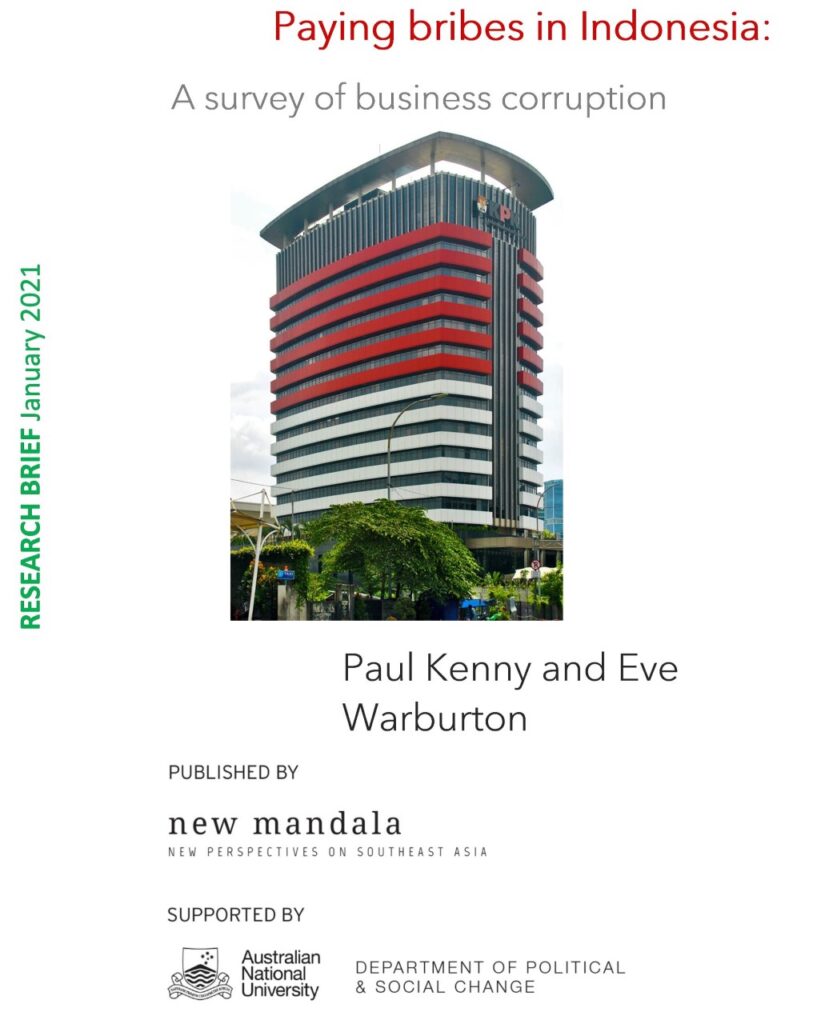
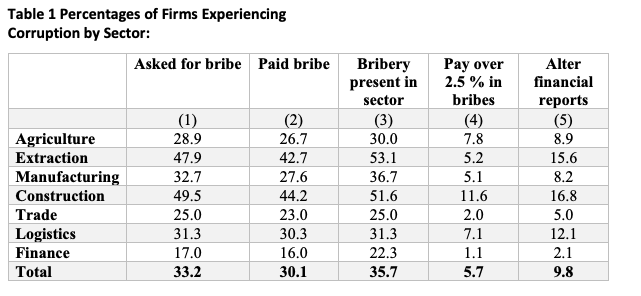
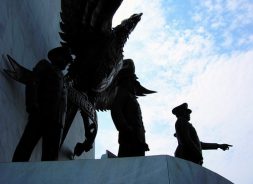
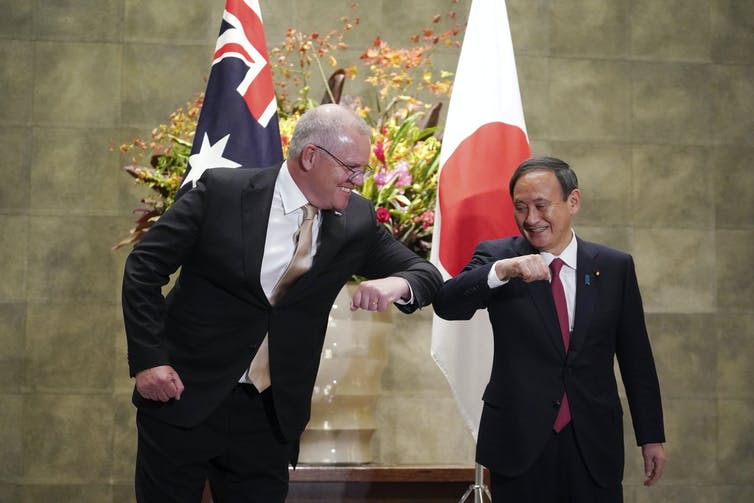 China warned Australia and Japan will ‘pay a corresponding price” if a new defence pact signed between the countries threatens its security. Image: The Conversation/Eugene Hoshiko/AP
China warned Australia and Japan will ‘pay a corresponding price” if a new defence pact signed between the countries threatens its security. Image: The Conversation/Eugene Hoshiko/AP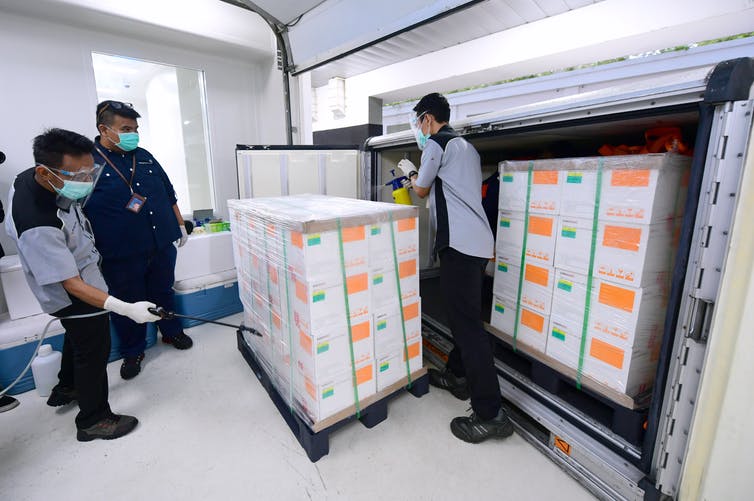 Boxes containing coronavirus vaccines made by Sinovac arriving last week at a facility in Indonesia. Image: The Conversation/Indonesian Presidential Palace/AP
Boxes containing coronavirus vaccines made by Sinovac arriving last week at a facility in Indonesia. Image: The Conversation/Indonesian Presidential Palace/AP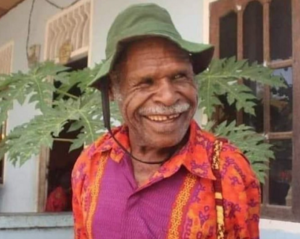 Rev Yeremia Zanambani … alleged to have been shot dead by the Indonesian military in Hitadiap village on September 19. Image: Suara Papua
Rev Yeremia Zanambani … alleged to have been shot dead by the Indonesian military in Hitadiap village on September 19. Image: Suara Papua